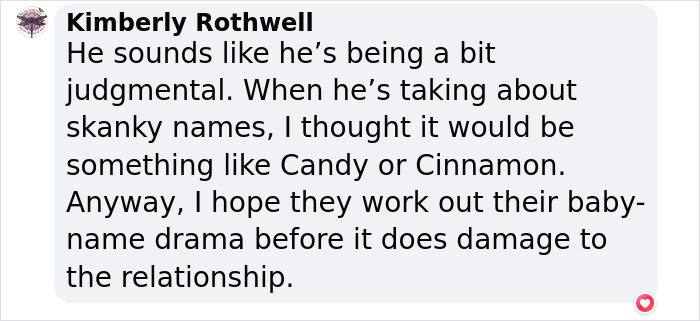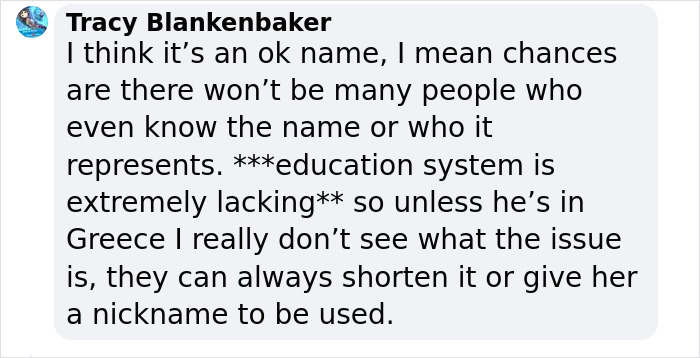Naming children is usually one of the fun things that come with becoming a mother or a father. But if the ideas of what the child should be called clash too strongly, it can just as quickly become a battleground for parents’ opinions, turning pleasantness into frustration.
One good example is a recent story of a man who got into a heavy argument with his wife, who was set on naming their future daughter after “Clytemnestra,” a character from Greek mythology with a pretty dark and tragic story that may not be to everyone’s, and certainly not the husband’s, liking. Scroll down to read the full story!
More info: Slate
The process of naming a child is something that can go from fun into frustrating in a flash, especially if the partners have radically different ideas

Image credits: Heiner (not the actual photo)
A Greek immigrant and a mythology lover learned that they were expecting a baby girl and started looking for a name
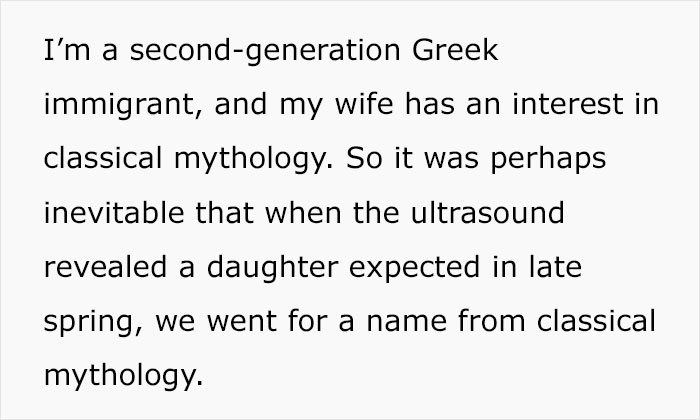
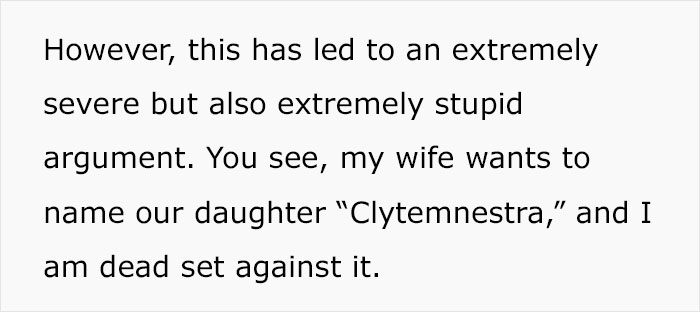



Image credits: Afif Ramdhasuma (not the actual photo)
The woman proposed to call their daughter Clytemnestra, which the man thought was indecent because of how the mythological character of the same name is portrayed

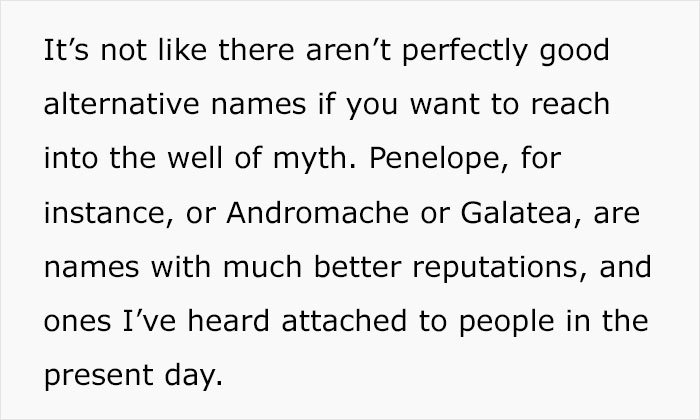

Image credits: Greek Tragedy
The man explained his reasons and proposed other options, but the couple didn’t manage to find a compromise
The author began by explaining that he’s a second-generation Greek immigrant married to a classical mythology lover. But while he knew their children would have a strong chance of being named after mythology characters, he never expected that one of those names would be “Clytemnestra.”
This started a very severe argument between the married couple. While the woman was set on going with the name she chose, he felt exactly the opposite, saying that it was a bad name and he hadn’t heard of anybody being named that.
According to him, in the mythology, Clytemnestra was a “skank” who murdered her husband as he was about to learn of her affair. He argued that even though hardly anyone would recognize the name well enough to tease their daughter over it, many better and more reputable alternatives in the mythology could be used instead of this one.
The naming situation was left at a stalemate, with both parents refusing to compromise. Thus, the man came online looking for solutions.
The commenters were divided. Some agreed with the author, saying that the name is odd and, at the very least, difficult to write or pronounce. But at the same time, others defended the mother’s choice, saying that it was a decent name and no one would know the meaning anyway.
Few even bashed the poster over his ignorance, as while Oresteia‘s Clytemnestra was closer to how the man described her, in the Odyssey, she was actually portrayed as a strong, independent, and quick-witted character, defying the female gender role stereotypes and conventions.

Image credits: Jelleke Vanooteghem (not the actual photo)
A person’s name is a very important part of their identity, and therefore, naming a child is a much bigger responsibility than some people realize. But to find out just how much that really means, Bored Panda reached out to Nick Hatter, who is a Therapeutic Life Coach and the author of The 7 Questions: The Ultimate Toolkit to Boost Self-Esteem, Unlock Your Potential and Transform Your Life.
The expert started by explaining that rare names, like Clytemnestra, can have a significant negative impact on a child’s life, especially while growing up. “Unusual names could make children a target for bullying at school – and bullying can have a drastic and lasting effect on self-esteem and confidence, as well as increased stress and anxiety.”
But while it may be unnecessarily difficult to grow up with such a name, it’s not impossible to overcome these challenges. Nick suggested a couple of trauma reduction techniques, such as Rewind and EMDR, as well as shame reduction techniques that, under the care of a suitably trained professional, could help take out the emotional charge from any lasting memories caused by bullying.
Alternatively, a person dealing with this could try to flip the situation by owning and reframing it, looking at their name not as unusual but as unique. “Of course, a solution-focused approach might be to just have a legal name change to a sensible first name,” said the expert.

Image credits: Kelly Sikkema (not the actual photo)
But like everywhere else, you can always find both pluses and minuses. Nick explained that a unique name can be a great talking point when dating, making you more interesting and memorable.
The expert also shared that while 20 years ago it might’ve been beneficial to change your name to better fit the society around you, as he had to do it himself, nowadays, “Having an unusual or foreign-sounding name could potentially benefit job and university applicants, seeing as many large western corporations and universities respectively are actively looking to increase (or fulfill) diversity targets.”
Lastly, Nick referenced a study from 1978 in which, out of 116 participants with unusual names, women scored significantly higher on Capacity for Sociability, Social Presence, Self-Acceptance, and Psychological Mindedness. So, if the girl from the story ends up being named Clytemnestra, at the very least, she’ll have an advantage in this field.
Ultimately, naming someone shouldn’t be taken lightly. While giving a child a unique name isn’t necessarily bad, this kind of decision can strongly impact their life, so the choice should be considered thoroughly. But in the end, the decision is up to the parents, and all we can really do is hope that no matter what name will be given to the girl in question, she’ll turn out great!
What did you think of this story? Do you know any unusual names and stories about them you’d like to share? The comment section is waiting for you!
People in the comments were divided, with some agreeing that this name is a bad idea and others defending it and badmouthing the poster




